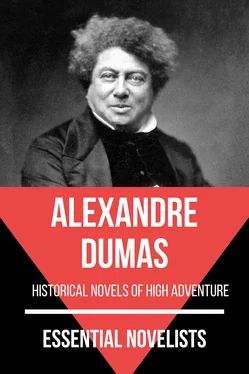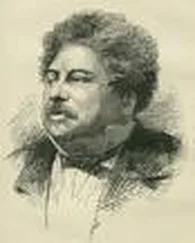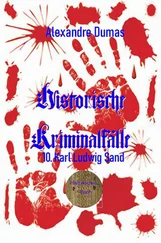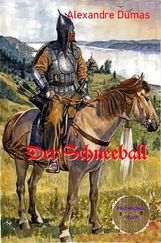At the end of a few minutes Monsieur raised his voice, and said, “I want for this mission three or four volunteers, led by a man who can be depended upon.”
“As to the man to be depended upon, I have him under my hand, monsieur,” said M. Dessessart, pointing to d’Artagnan; “and as to the four or five volunteers, Monsieur has but to make his intentions known, and the men will not be wanting.”
“Four men of good will who will risk being killed with me!” said d’Artagnan, raising his sword.
Two of his comrades of the Guards immediately sprang forward, and two other soldiers having joined them, the number was deemed sufficient. D’Artagnan declined all others, being unwilling to take the first chance from those who had the priority.
It was not known whether, after the taking of the bastion, the Rochellais had evacuated it or left a garrison in it; the object then was to examine the place near enough to verify the reports.
D’Artagnan set out with his four companions, and followed the trench; the two Guards marched abreast with him, and the two soldiers followed behind.
They arrived thus, screened by the lining of the trench, till they came within a hundred paces of the bastion. There, on turning round, d’Artagnan perceived that the two soldiers had disappeared.
He thought that, beginning to be afraid, they had stayed behind, and he continued to advance.
At the turning of the counterscarp they found themselves within about sixty paces of the bastion. They saw no one, and the bastion seemed abandoned.
The three composing our forlorn hope were deliberating whether they should proceed any further, when all at once a circle of smoke enveloped the giant of stone, and a dozen balls came whistling around d’Artagnan and his companions.
They knew all they wished to know; the bastion was guarded. A longer stay in this dangerous spot would have been useless imprudence. D’Artagnan and his two companions turned their backs, and commenced a retreat which resembled a flight.
On arriving at the angle of the trench which was to serve them as a rampart, one of the Guardsmen fell. A ball had passed through his breast. The other, who was safe and sound, continued his way toward the camp.
D’Artagnan was not willing to abandon his companion thus, and stooped to raise him and assist him in regaining the lines; but at this moment two shots were fired. One ball struck the head of the already-wounded guard, and the other flattened itself against a rock, after having passed within two inches of d’Artagnan.
The young man turned quickly round, for this attack could not have come from the bastion, which was hidden by the angle of the trench. The idea of the two soldiers who had abandoned him occurred to his mind, and with them he remembered the assassins of two evenings before. He resolved this time to know with whom he had to deal, and fell upon the body of his comrade as if he were dead.
He quickly saw two heads appear above an abandoned work within thirty paces of him; they were the heads of the two soldiers. D’Artagnan had not been deceived; these two men had only followed for the purpose of assassinating him, hoping that the young man’s death would be placed to the account of the enemy.
As he might be only wounded and might denounce their crime, they came up to him with the purpose of making sure. Fortunately, deceived by d’Artagnan’s trick, they neglected to reload their guns.
When they were within ten paces of him, d’Artagnan, who in falling had taken care not to let go his sword, sprang up close to them.
The assassins comprehended that if they fled toward the camp without having killed their man, they should be accused by him; therefore their first idea was to join the enemy. One of them took his gun by the barrel, and used it as he would a club. He aimed a terrible blow at d’Artagnan, who avoided it by springing to one side; but by this movement he left a passage free to the bandit, who darted off toward the bastion. As the Rochellais who guarded the bastion were ignorant of the intentions of the man they saw coming toward them, they fired upon him, and he fell, struck by a ball which broke his shoulder.
Meantime d’Artagnan had thrown himself upon the other soldier, attacking him with his sword. The conflict was not long; the wretch had nothing to defend himself with but his discharged arquebus. The sword of the Guardsman slipped along the barrel of the now-useless weapon, and passed through the thigh of the assassin, who fell.
D’Artagnan immediately placed the point of his sword at his throat.
“Oh, do not kill me!” cried the bandit. “Pardon, pardon, my officer, and I will tell you all.”
“Is your secret of enough importance to me to spare your life for it?” asked the young man, withholding his arm.
“Yes; if you think existence worth anything to a man of twenty, as you are, and who may hope for everything, being handsome and brave, as you are.”
“Wretch,” cried d’Artagnan, “speak quickly! Who employed you to assassinate me?”
“A woman whom I don’t know, but who is called Milady.”
“But if you don’t know this woman, how do you know her name?”
“My comrade knows her, and called her so. It was with him she agreed, and not with me; he even has in his pocket a letter from that person, who attaches great importance to you, as I have heard him say.”
“But how did you become concerned in this villainous affair?”
“He proposed to me to undertake it with him, and I agreed.”
“And how much did she give you for this fine enterprise?”
“A hundred louis.”
“Well, come!” said the young man, laughing, “she thinks I am worth something. A hundred louis? Well, that was a temptation for two wretches like you. I understand why you accepted it, and I grant you my pardon; but upon one condition.”
“What is that?” said the soldier, uneasy at perceiving that all was not over.
“That you will go and fetch me the letter your comrade has in his pocket.”
“But,” cried the bandit, “that is only another way of killing me. How can I go and fetch that letter under the fire of the bastion?”
“You must nevertheless make up your mind to go and get it, or I swear you shall die by my hand.”
“Pardon, monsieur; pity! In the name of that young lady you love, and whom you perhaps believe dead but who is not!” cried the bandit, throwing himself upon his knees and leaning upon his hand—for he began to lose his strength with his blood.
“And how do you know there is a young woman whom I love, and that I believed that woman dead?” asked d’Artagnan.
“By that letter which my comrade has in his pocket.”
“You see, then,” said d’Artagnan, “that I must have that letter. So no more delay, no more hesitation; or else whatever may be my repugnance to soiling my sword a second time with the blood of a wretch like you, I swear by my faith as an honest man—” and at these words d’Artagnan made so fierce a gesture that the wounded man sprang up.
“Stop, stop!” cried he, regaining strength by force of terror. “I will go—I will go!”
D’Artagnan took the soldier’s arquebus, made him go on before him, and urged him toward his companion by pricking him behind with his sword.
It was a frightful thing to see this wretch, leaving a long track of blood on the ground he passed over, pale with approaching death, trying to drag himself along without being seen to the body of his accomplice, which lay twenty paces from him.
Terror was so strongly painted on his face, covered with a cold sweat, that d’Artagnan took pity on him, and casting upon him a look of contempt, “Stop,” said he, “I will show you the difference between a man of courage and such a coward as you. Stay where you are; I will go myself.”
Читать дальше












